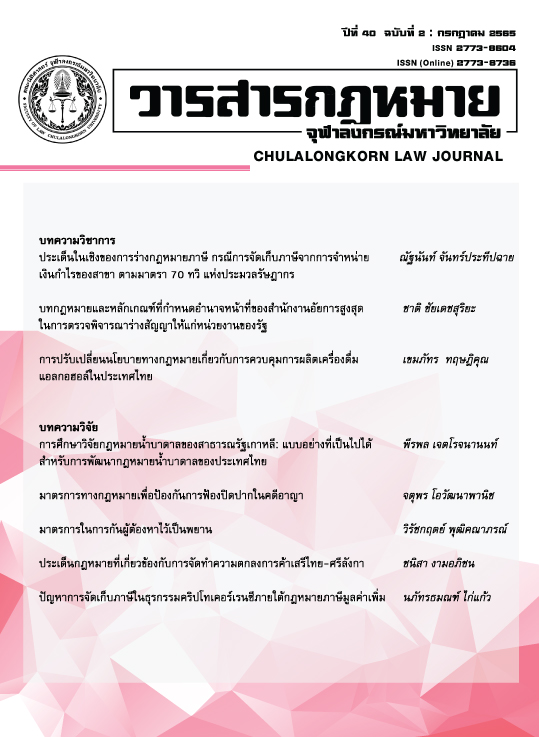Issues of Tax Law Drafting on Branch Profit Remittance Tax under Section 70 Bis of Revenue Code
Main Article Content
Abstract
A foreign company can choose to operate in another country whether in the form of establishing a subsidiary or going to have a branch of the company. If its subsidiary or its branch is profitable, the company may remit its profit back to the home country in form of “Dividends” or “Branch Profit”, as the case may be. However, because its branch and the headquarters are legally the same legal entity, remittance of its branch profits back is therefore not considered as income of the company (the headquarters). As a result, a source country where the company's branches are located has no taxing right to collect tax on the remittance of such profits. In contrast, a subsidiary and a parent company are considered separate legal persons. Profit remittance back by the parent company in the form of dividends is considered as the income of the parent company. As a result, the country where the dividends are derived has the taxing right to collect tax from such a dividend payment. Therefore, many countries have introduced a branch profit tax. This includes Thailand, which enacted Section 70 Bis of the Revenue Code to collect a similar branch profit tax, the so-called "branch profit remittance tax". Thus, even though branch profit tax and branch profit remittance tax look similar, tax drafting, including tax base, tax timing, and tax collection, is different from each other. According to the study's findings, in terms of legal drafting, Section 70 Bis of the Revenue Code is incompatible with the context of how a branch distributes its profit back to headquarters. As a result, collecting taxes under Section 70 Bis of the Revenue Code will cause issues for both taxpayers who pay taxes and tax officials who collect taxes efficiently.
Article Details

This work is licensed under a Creative Commons Attribution-NonCommercial-NoDerivatives 4.0 International License.
The copyright in this website and the material on this website (including without limitation the text, computer code, artwork, photographs, images, music, audio material, video material and audio-visual material on this website) is owned by Chulalongkorn University Law Journal and its licensors.
1. Chulalongkorn University Law Journal grants to you a worldwide non-exclusive royalty-free revocable license to:
- view this website and the material on this website on a computer or mobile device via a web browser;
- copy and store this website and the material on this website in your web browser cache memory; and
- print pages from this website for your use.
- All articles published by Chulalongkorn University Law Journal are licensed under the Creative Commons Attribution 4.0 International License. This permits anyone to copy, redistribute, remix, transmit and adapt the work provided the original work and source is appropriately cited.
2. Chulalongkorn University Law Journal does not grant you any other rights in relation to this website or the material on this website. In other words, all other rights are reserved. For the avoidance of doubt, you must not adapt, edit, change, transform, publish, republish, distribute, redistribute, broadcast, rebroadcast or show or play in public this website or the material on this website (in any form or media) without appropriately and conspicuously citing the original work and source or Chulalongkorn University Law Journal prior written permission.
3. You may request permission to use the copyright materials on this website by writing to journal@law.chula.ac.th.
4. Chulalongkorn University Law Journal takes the protection of its copyright very seriously. If Chulalongkorn University Law Journal discovers that you have used its copyright materials in contravention of the license above, Chulalongkorn University Law Journal may bring legal proceedings against you seeking monetary damages and an injunction to stop you using those materials. You could also be ordered to pay legal costs.
If you become aware of any use of Chulalongkorn University Law Journal's copyright materials that contravenes or may contravene the license above or any material on the website that you believe infringes your or any other person's copyright, please report this by email to journal@law.chula.ac.th.


